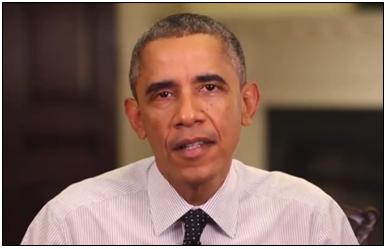“The Federal Communications Commission is an independent agency, and ultimately this decision is theirs alone.”
That was President Barack Obama’s November 10 take on who gets to decide whether new rules governing so-called “net neutrality” — regulating broadband Internet providers as “common carriers” under the Communications Act of 1934 — gets implemented.
At issue are proposed regulations by the Federal Communications Commission (FCC), “Protecting and Promoting the Open Internet,” that were proposed in July. A prior attempt to implement the rulemaking had been squashed by the D.C. Circuit Court of Appeals in January.
“Unfortunately, the court ultimately struck down the rules — not because it disagreed with the need to protect net neutrality, but because it believed the FCC had taken the wrong legal approach,” Obama claimed in his statement.
Which may be putting it mildly. To wit, the court said “Given that the Commission has chosen to classify broadband providers in a manner that exempts them from treatment as common carriers, the Communications Act expressly prohibits the Commission from nonetheless regulating them as such. Because the Commission has failed to establish that the anti-discrimination and anti-blocking rules do not impose per se common carrier obligations, we vacate those portions of the Open Internet Order.”
In other words, under the 1996 Telecommunications Act, Internet service providers were exempted from being treated under Title II of the Communications Act of 1934 as common carriers. Instead, they were be treated as exempt “information services” providers by the FCC in an initial 2002 determination.
Because of that, the FCC cannot now go back and treat them as if they were common carriers, said the court. That is, not without the FCC going back and reversing its determination.
Which is exactly what Obama wants the agency to do: “I believe the FCC should reclassify consumer broadband service under Title II of the Telecommunications Act.”
But that is untested. Can the FCC just change its mind?
The key question would be: Are broadband Internet providers like Verizon “information services” providers because the law says so, or because the FCC says so?
In 2005, the Supreme Court said that the FCC’s classification as an “information services” provider exempt from Title II common carrier restrictions was “a permissible reading of the Communications Act.”
Under Chevron U.S.A., Inc. v. Natural Resources Defense Council, Inc. (1984), the court decided “[I]f the statute is silent or ambiguous with respect to the specific question, the issue for the court is whether the agency’s answer is based on a permissible construction of the statute.”
Meaning, the Supreme Court ruled the agency could treat them as “information services” providers, not that now reclassifying them as common carriers would necessarily also be permissible. Depending on how it was done and what the facts in the case were, it very well may not be.
As the Heartland Institute’s Randolph May recently noted, “the Commission will need to show, as a factual matter, from a functional standpoint and from the consumer’s perspective, why its earlier technical analysis concerning the integrated nature of Internet service — that is, the inseparability of the transmission and information services components — is no longer ‘operative.’”
Meaning, there is no guarantee the FCC’s attempts to implement “net neutrality” will ever pass judicial muster. Deference under Chevron is not a carte blanche for an agency to do whatever it pleases. The facts matter.
Whatever the merits of “net neutrality,” — Obama suggests that broadband providers might engage in some sort of censorship — the executive branch simply may lack the authority to do anything about it.
So, what to do?
Obama seems to think he just keeps trying to do the same thing over and over again, expecting different results.
“Rather than taking this as a cue to petition Congress to change the law, Obama is once again pushing the Federal Communications Commission to regulate the Internet as Congress never intended,” Americans for Limited Government President Nathan Mehrens said after Obama’s statement was issued.
To which, he offered a simple solution: “If Obama wants so-called net neutrality rules, that is, to change the law, he should go to the nation’s sole lawmaking institution: Congress.”
Hey, why didn’t Obama think of that? Instead he continues to rely on his expansive view of executive authority for essentially everything — that he need not wait for Congress to act.
But in this case, that might just prove to be his undoing.
Robert Romano is the senior editor of Americans for Limited Government.







